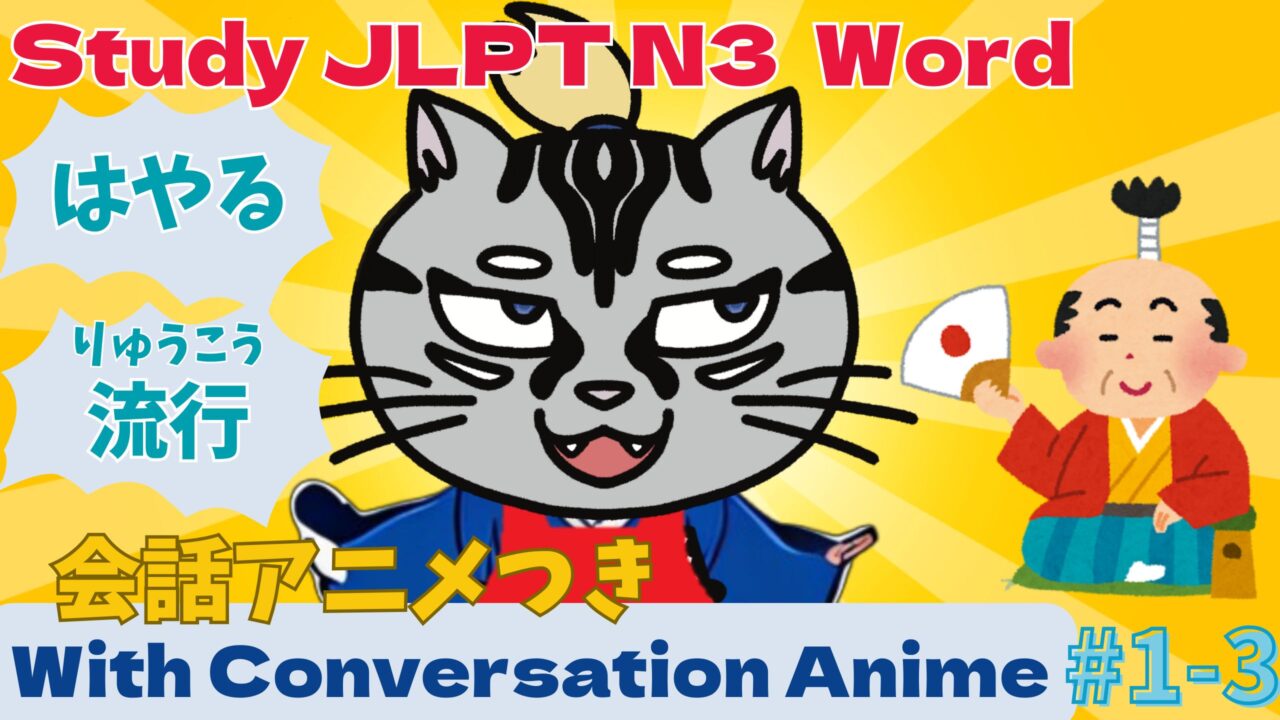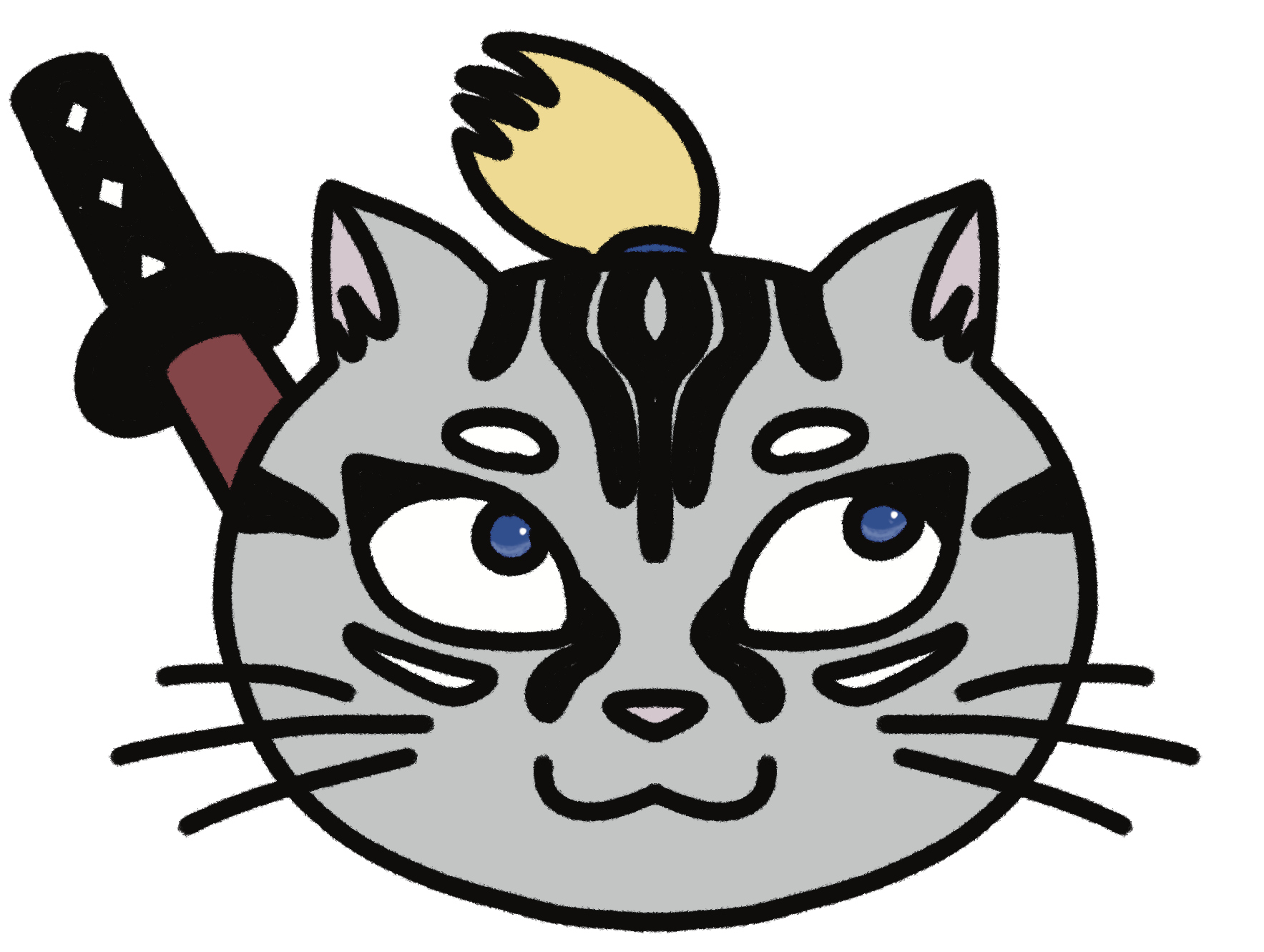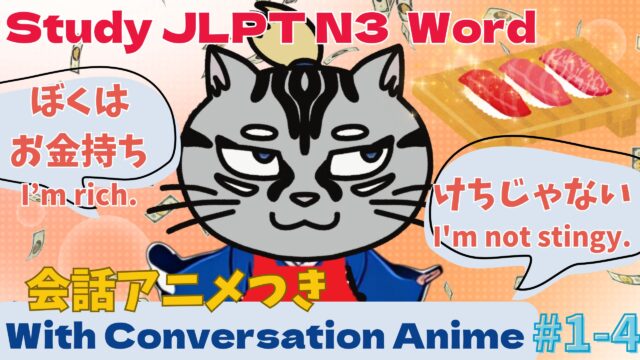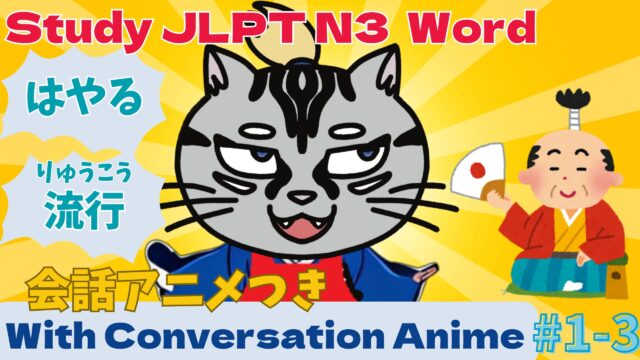ことばについて説明します。中級のことばです。
VOICEVOX:ちび式じい
①ある時期にある事柄が盛んに世にもてはやされる。流行する。
Fashion, Fad
②病気などが広がる。
Go around.
③商売などが繁盛する。
①病気が一時的に広く世間に広がること。
②一時的に世間に広く受け入れられ、用いられること。はやり。
スクリプト|Script
みなさん、こんにちは。日本語(にほんご)教師(きょうし)のココです。
I’m Jova. I am a Japanese learner. I’m a Samurai cat.
私(わたし)はきなこ。ココのアシスタント。よろしくね。
今回(こんかい)は「はやる」ということばを説明(せつめい)します。
「はやる」は多(おお)くの人(ひと)に広(ひろ)がるという意味(いみ)です。
例(たと)えば、はやっている服(ふく)、はやっているファッションはたくさんの人(ひと)に広(ひろ)がって、たくさんの人(ひと)が着(き)ている服(ふく)、ファッションという意味(いみ)です。
Trend. Fashion. Fad.
みなさんの国(くに)では今(いま)、どんなファッションがはやっていますか。
Samurai style.
それはジョバだけ。はやってない。
ファッションだけでなく、はやっていることば、はやっているゲームなど、ある時期(じき)に大勢(おおぜい)の人(ひと)によく使(つか)われているものに言(い)うことができます。
また病気(びょうき)などが広(ひろ)がるときも「はやる」を使(つか)います。「インフルエンザがはやっている。」は、インフルエンザが広(ひろ)がって、たくさんの人(ひと)がインフルエンザになっているという意味(いみ)です。
Go around.
「はやる」を漢字(かんじ)で書(か)くとこう書(か)きます。「流行る」 ここの部分(ぶぶん)だけだと「流行(りゅうこう)」と読(よ)みます。「流行(りゅうこう)する」も「はやる」と同(おな)じように「この服(ふく)が流行(りゅうこう)している。」「冬(ふゆ)は風邪(かぜ)が流行(りゅうこう)する。」などと使(つか)うことができます。
ではこの漢字(かんじ)を見(み)てみましょう。この漢字(かんじ)の部首(ぶしゅ)は何(なん)でしょう。
訓読み|Kun-Reading:ながーれる、ながーす
音読み|On-Reading:リュウ、ル
意味|Meaning:①流れる ②広まる
部首|Radical:氵(さんずい)|Water
部首(ぶしゅ)とは漢字(かんじ)を分(わ)けるためのものです。部首(ぶしゅ)には意味(いみ)があるので、知(し)っておくと、漢字(かんじ)を覚(おぼ)えるのに便利(べんり)です。この漢字(かんじ)の部首(ぶしゅ)は「氵(さんずい)」です。これは水(みず)を表(あらわ)します。この漢字(かんじ)の意味(いみ)は「流(なが)れる」「流(なが)す」の意味(いみ)があります。この川(かわ)はきれいな水(みず)が流(なが)れています。お風呂(ふろ)の水(みず)を流(なが)します。部首(ぶしゅ)の水(みず)が関係(かんけい)しています。そしてこの漢字(かんじ)には「広(ひろ)がる」という意味(いみ)もあります。なので今回(こんかい)のことば「流行(はや)る」、「流行(りゅうこう)する」にこの漢字(かんじ)が使(つか)われています。水(みず)が流(なが)れて、広(ひろ)がっていくというイメージで覚(おぼ)えるといいと思(おも)います。
例文(れいぶん)です。
今年(ことし)はこの形(かたち)の服(ふく)がはやっている。
風邪(かぜ)がはやっているので、気(き)をつけてください。
このかばんは流行(りゅうこう)に関係(かんけい)なく、長(なが)く使(つか)える。
会話|Conversation
では、日本語(にほんご)を勉強(べんきょう)しているサムライキャット、ジョバの会話(かいわ)を見(み)てみましょう。ジョバは日本(にほん)に留学(りゅうがく)しています。ジョバは日本語(にほんご)学校(がっこう)に通(かよ)いながら、コンビニでバイトをしています。バイト先(さき)での会話(かいわ)です。ジョバの日本語(にほんご)は中級(ちゅうきゅう)レベルです。
Let’s take a look at a conversation between Jova, a samurai cat studying Japanese. Jova studies in Japan. While Jova goes to Japanese language school, he works at a convenience store. This is a conversation at his part-time job. Jova’s Japanese is at an intermediate level.
ジョバ君(くん)、ジュースが少(すく)なくなってるから、足(た)しといてもらえる?
Jova, I’m running low on juice, can you add some more?
わかったなりなり。かしこまり~。
Okay.
ジョバ君(くん)、ゴミ箱(ばこ)の掃除(そうじ)、お願(ねが)い。
Jova, clean out the trash, please.
わかったなりなり。かしこまり~。
Okay.
さっきからずっとなんでそれ言(い)ってるの?
Why have you been saying that?
え?これ言(い)うの今(いま)はやってるでしょ?
Isn’t this a popular thing to say now?
全然(ぜんぜん)はやってないよ。
No, it’s not.
えー!はやってない?!
What?! It is not popular?
確(たし)かにに前(まえ)は言(い)ってる人もいたけど、もう誰(だれ)も使(つか)ってないよ。
Some people used to say that, but no one uses it anymore.
そうなの?!バラエティ番組(ばんぐみ)でたくさん聞(き)いたんだけど。
Really? I watched it on a variety show and people were using it.
何(なん)ていう番組(ばんぐみ)?
What is a name of the program?
『サワムラケンのドジ侍(ざむらい)様(さま)』
“Sawamura Ken’s Doji-Samurai”
わかったなりなり。かしこまり~。
それ20年(にじゅうねん)前(まえ)の番組(ばんぐみ)だから。古(ふる)いよ。
That’s a 20-year-old program. It’s old.
な~んだ。もうはやってないんだ。でも気(き)にいっちゃったから、使(つか)おっと。
I see. It’s not in fashion anymore. But I like it, so I’ll use it.
別(べつ)にいいけど・・・ギャグだから、使(つか)うのは友達(ともだち)だけにしなよ。
I don’t mind but it’s a joke, so use it only with your friends.
わかったなりなり。かしこまり~。
Okay.
1時間後(いちじかんご)|1 hour later
ジョバさん、レジお願(ねが)い。
Jova-san, cashier, please.
わかったなりなり。かしこまり~。あ・・・店長(てんちょう)・・・(やばい)
Okay. Oh, manager.
何(なん)だい?その言(い)い方(かた)は。
What is it? That’s the way you talk.
口癖(くちぐせ)になってしまったようです。
It seems to have become a habit of speech.
店長(てんちょう)、わかりました。かしこまりました。承知(しょうち)いたしました。
Manager, I got it.
ことば|Word
- 足す(たす)|Add
- バラエティ番組(番組)|Variety TV program
- 口癖(くちぐせ)|Favorite word/phrase
自動詞・他動詞|Ji-Verb/Ta-Verb
自動詞|Ji-Verb:~が流れる
他動詞|Ta-Verb:~を流す
英語スクリプト|Script in English
Hi, everyone. I am Coco, a Japanese teacher.
I’m Jova. I am a Japanese learner. I’m a Samurai cat.
オレはジョバ。日本語を勉強しているよ。サムライキャットだぜ。
I’m Kinaco, Coco’s assistant. Nice to meet you.
I will explain the word “hayaru”.
It means to spread to many people.
For example, fashionable clothes and fashions spread to many people and are worn by many people.
Trend. Fashion. Fad.
What kind of fashion is popular in your country now?
Samurai style.
It’s only you. Not popular.
It can be used not only for fashion, but also for words that are popular, games that are popular, and other things that are used by a large number of people at a given time.
The word is also used to describe the spread of a disease. The flu is spreading. means that the flu is spreading and many people are getting it.
Go around.
The kanji for this word is written as follows. The word is written in kanji as follows. As “hayaru”, it can be used like “These clothes are in fashion” or “In winter, colds are popular”.
Now let’s look at this kanji. What is the radical of this kanji?
A radical is used to separate Kanji. The radicals have meanings, and it is useful to know them to help you remember Kanji. The radical of this Kanji is “氵” (sanzui). It represents water. The meaning of this Kanji is “to flow”. This river is flowing with clean water. The water in the bath is flowing. The radical water is related. And this Kanji also has the meaning of “spread.” That is why this Kanji is used in the words “流行る” and “流行する”. It is good to remember the image of water flowing and spreading.
Here are example sentences.
This shape of clothing is in vogue this year.
Colds are going around, so please be careful.
This bag can be used for a long time regardless of trends.











